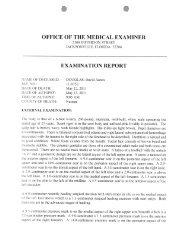Sentenced to Stigma: Segregation of HIV-Positive Prisoners - AL.com
Sentenced to Stigma: Segregation of HIV-Positive Prisoners - AL.com
Sentenced to Stigma: Segregation of HIV-Positive Prisoners - AL.com
Create successful ePaper yourself
Turn your PDF publications into a flip-book with our unique Google optimized e-Paper software.
available at all institutions. This is a clinical judgment, based upon the acuity<strong>of</strong> care required for the patient. Patients with <strong>HIV</strong> infection may requireisolation if, for example, they have pulmonary tuberculosis. <strong>HIV</strong> patientsshould not be medically isolated solely because <strong>of</strong> their <strong>HIV</strong> status. 124Best practice for <strong>HIV</strong> treatment and services is not “one size fits all.” People with <strong>HIV</strong> varywidely in individual health status, with many living for years without symp<strong>to</strong>ms and withoutneed for medication. Those suffering from opportunistic infection or experiencing<strong>com</strong>plications may need hospitalization and other targeted services. There is no onemedication regimen that is "best" for all patients infected with <strong>HIV</strong>. The time <strong>to</strong> startantiretroviral therapy (ART) for <strong>HIV</strong> depends upon several fac<strong>to</strong>rs, including the person's Tcell count, age, underlying medical conditions, his<strong>to</strong>ry <strong>of</strong> an AIDS-defining illness, and theperson's willingness <strong>to</strong> <strong>com</strong>mit <strong>to</strong> lifelong treatment. Proper utilization <strong>of</strong> ART requiresongoing patient moni<strong>to</strong>ring <strong>to</strong> assess therapeutic response and <strong>to</strong> identify adverse eventsrelated <strong>to</strong> chronic administration <strong>of</strong> potentially <strong>to</strong>xic medications. Patients who are startedon ART should generally have follow-up within one <strong>to</strong> two weeks <strong>to</strong> ask patients aboutadverse effects, adherence, and prevention <strong>of</strong> transmission. Once patients are clinicallystable on their ART regimen, medical visits generally decrease <strong>to</strong> every three months. 125Clearly, segregation is not intrinsically related <strong>to</strong> high quality medical care. When prisonerswere first segregated In Alabama and Mississippi decades ago, they initially received suchpoor care that federal court action was required. 126 In the US, forty-seven other states andthe federal Bureau <strong>of</strong> Prisons provide medical care <strong>to</strong> prisoners with <strong>HIV</strong> without segregatingthem from other prisoners. These include Florida and New York, the two states with thehighest numbers <strong>of</strong> prisoners living with <strong>HIV</strong>. These states, as well as Texas, California andmany others, make individual health determinations and distinguish between prisonersneeding routine medical care and prisoners requiring more intensive services. <strong>Prisoners</strong> inthe latter group are transferred <strong>to</strong> medical units where prisoners with a variety <strong>of</strong> medicalconditions, not only <strong>HIV</strong>, have greater access <strong>to</strong> specialty care. 127124 Ibid.125 U.S. Department <strong>of</strong> Health and Human Services, AIDS Info-<strong>HIV</strong> Clinical Guidelines, Guidelines for the Use <strong>of</strong> Antiretroviralagents in Adults and Adolescents, December 1, 2009.126 Moore v. Fordice, A-90CV-125 (N.D. Miss. July 19, 1999); Leatherwood v. Campbell, CV-02-BE-2812-W, U.S. District Court,Northern District <strong>of</strong> Alabama (2004).;127 Memorandum from Jackie Walker <strong>of</strong> the ACLU-NPP, “Communications with state prison <strong>of</strong>ficials re: <strong>HIV</strong> care” September 25,2009, on file with Human Rights Watch and ACLU-NPP.<strong>Sentenced</strong> <strong>to</strong> <strong>Stigma</strong> 40















